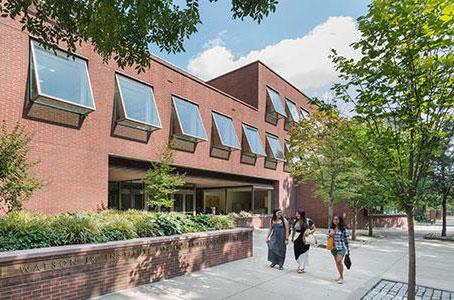PROVIDENCE, R.I. [Brown University] — Two of Brown University’s major centers for the study and teaching of policy — the Thomas J. Watson Jr. Institute for International Studies and the A. Alfred Taubman Center for Public Policy and American Institutions — announced today that they will begin a process of integration.
The Watson Institute and the Taubman Center have complementary missions and engage in synergistic work that is aligned with key areas of the University’s new strategic plan, Building on Distinction. The plan to integrate will allow the organizations to collaborate more effectively in the delivery of education and research to address pressing local, national, and global issues and challenges.
“Integrating Watson and Taubman more closely recognizes that in today’s globally interconnected world, the boundaries between ‘domestic’ and ‘international’ policy are blurred,” said Richard M. Locke, director of the Watson Institute. “The major challenges facing society — and the possible solutions to these challenges — do not stop at geographic borders. In fact, the very best policy-focused research is comparative in nature.”
James Morone, director of the Taubman Center, said, “This plan will enhance both centers’ ability to do what we do best: Take our ideals, our visions of a better world, and combine them with rigorous scholarship and demanding education. Whether it’s health care or economic development or education or the environment, our role is to help leaders solve problems — in Rhode Island, the United States, and around the world.”
As part of the integration process, the Taubman Center will become a semi-autonomous center within the Watson Institute, similar to the Center for Latin American and Caribbean Studies.
The Taubman Center will continue to conduct regular public opinion polls on city, state, and national issues and public officials, and will proceed with plans to enhance the resources devoted to this critical work. The undergraduate concentration and masters program in public policy will continue to be offered at Brown, and will become broader and thus stronger as a result of this integration.
Locke and Morone, along with other University administrators, will spend the 2014-15 academic year working with faculty, students and others to advance the integration process, assessing the needs of both the Taubman Center and the Watson Institute moving forward.
Thomas J. Watson Jr. Institute for International Studies
The Thomas J. Watson Jr. Institute for International Studies seeks to promote a just and peaceful world through research, teaching, and public engagement. The Institute is a community of scholars whose work aims to help us understand and address the world's great challenges, such as globalization, economic uncertainty, security threats, environmental degradation, and poverty. Focusing on three main areas – development, security, and governance – the Institute leverages Brown's tradition of true interdisciplinarity to foster innovative, policy-relevant scholarly activities. From Latin America to China, from the Middle East to Southeast Asia, the strongest theoretical models emerge through observations in the field.
A. Alfred Taubman Center for Public Policy and American Institutions
The A. Alfred Taubman Center for Public Policy and American Institutions seeks to influence local, national, and global policymakers through high-quality research, teaching excellence, and a commitment to community service. Since 1984, the Taubman Center has been a hub, connecting students, faculty, the community, and distinguished visitors to interdisciplinary study, research, and advocacy of sound public policy and the betterment of American institutions.

